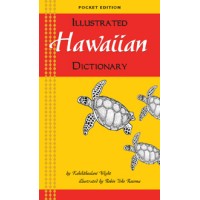
Shoyu is the Hawaiian slang term for soy sauce.

The first time you hear the word shoyu you’re probably ordering food at a restaurant. So when a native says “I have to go 5-4-4,” it’s the same as shishi. There is also a Japanese joke about urination based on the phrase “5-4-4” which reads go shishi in Japanese. Many words in Hawaiian pidgin are derived from the Japanese language. You also may hear a lot of the local Hawaiian keiki (children) saying this to their Auntie, or Tutu (grandmother).

You can use this to politely tell whoever you need to, that you have to go pee. I mean really, how many times can you use the mainland equivalent of “whatchamacalit” before you sound ridiculous? This Hawaiian slang term can literally mean anything…seriously! Da Kine is the ultimate pidgin phrase! “Eh, you get any da kine?” or “Shelly went to get da kine, from da kine, ova da kine” It can be a bit tricky to understand, but incredibly useful. Although it seems obvious, there’s a big difference between saying “hello” and saying “what’s up?” The locals are always excited to meet new people and “talk story” (chat, shoot the breeze). “Howzit?” is a Hawaiian slang phrase for “Hey, how’s it going?” You’ll hear this one quite often, as you traverse the islands.

As I said before, be selective if you choose to try this one on your vacay, because speaking it to the wrong braddah can get you snatched up by 5-0!! The word “paka” translates to tobacco, and “lolo” means crazy hence Pakalolo is the term the local kine use in reference to excellent marijuana (mainlanders might refer to it as ‘MauiWowie’). This is pidgin to the max! Saying this one to the wrong person can definitely land you in jail. That’s YOU, brah! An outsider, stranger, tourist, non-islander, they know you! Pronounced may-ly-hee-nee (better get that straight, tourist!) this is about someone that wears socks and shoes, instead of “rubbah slippahs.” This term should not be confused with make (mah-kay) which means “dead,” i.e. Pau (pronounced pow) generally translates to “no more,” “all gone,” or “time’s up.” The term pau hana means “after work,” and references the best Happy Hours on the islands. This is pretty much what you say if your vehicle shits the bed. The most common phrase you will hear relating to this word, is “Mahalo for your k ō kua,” which basically means “thanks for your help!” This pidgin phrase is important, because as a visitor, if a native asks for your brief assistance, you should be able to understand and offer it out of respect. K ō kua luau is an extension of the saying, and directly translates to a stronger form of assistance, meaning “to contribute.” The Hawaiian slang phrase k ō kua simply means to help or assist.

Voices in the broadcast piece include Domingo Los Banos, Espy Garcia, Lee Tonouchi, Kent Sakoda and Jeffrey Siegel.You may see this on local signs here and there. "When I was in college, after I discovered guys writing in pidgin, I said 'Heck yeah, I can do this pidgin creative writing.' Eventually I did my 30-page research papers in pidgin. "The perception is the pidgin talker is going to be perceived as less intelligent than the standard English talker," he says. Lee Tonouchi, a pidgin scholar and author of books on the island chain's unique language, believes pidgin has its own intellectual foundation: Producer Dmae Roberts shares an audio postcard of some Hawaiians who are proud to speak pidgin - a home-grown version of English with words and phrases borrowed from Chinese, Japanese, Korean, Filipino, Portuguese, Hawaiian and other languages brought to the islands over the centuries. Pidgin scholar Lee Tonouchi reads from one of his books on the subject, Living Pidgin: Contemplations on Pidgin Culture


 0 kommentar(er)
0 kommentar(er)
